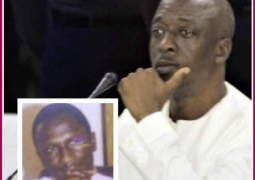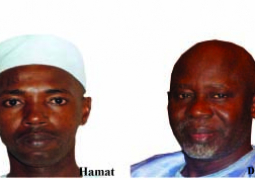Each year, the report draws much-needed attention to the horrors of human trafficking that flourish everywhere from fishing boats in Thailand and palm plantations in Malaysia, to brick kilns in India and the sex industry in just about every country worldwide.
Hidden behind the shadows, traffickers prey on men, women and children, luring the vulnerable among us with promises of honest employment that are merely a facade for work conditions that are dangerous, exploitative and sometimes deadly.
To date, the TIP Report’s country-by-country assessment has proven to be a powerful motivator, inspiring governments to improve efforts to reduce modern slavery in order to avoid the report’s lowest Tier 3 ranking - a diplomatic black eye that comes with the threat of U.S. sanctions.
The State Department’s power to influence other countries’ anti-trafficking efforts depends on the TIP Report’s integrity.
We see concrete progress that we attribute to the TIP Report’s influence, and that is why its credibility must be unassailable.
For example, the TIP Report was instrumental in galvanizing political will in Cameroon to pass legislation in 2012 making it a crime to traffic adults and children for sex or labor exploitation.
In the Philippines, the government has make profound reforms, including putting trafficking cases on a fast track for prosecution, in order to avoid a poor TIP ranking.
But how is the U.S. faring at home?
The TIP report has given America a top Tier 1 ranking since the State Department began reporting on U.S. progress in 2010.
Tier 1 status requires that countries make “appreciable progress” in efforts to combat modern slavery, and it is incumbent on the U.S. to use the annual assessment to look hard at its progress and to hold its leaders accountable if they’re not doing enough.
As a rule, “Do as I say, not as I do” is not a productive way to lead, and if we take a hard look at what the U.S. government is doing to fight domestic slavery - with resources that dwarf so many of the governments we critique each year - the honest conclusion is that it can and should do so much better.
The U.S. State Department estimates that as many as 17,500 men, women and children are trafficked into the United States each year.
Each year, thousands of men, women and children pay foreign labor recruiters for the promise of a good job in the United States, only to be trafficked into the sex trade or forced to work for little or no wages in farm fields, as domestic servants or childcare providers, in hotels, restaurants and other businesses.
Despite knowledge of this trafficking, Congress has failed to pass legislation that would oversee foreign labor contractors and ban recruitment fees that often force workers into conditions of debt bondage or modern slavery.
We don’t know how many children are trapped in modern slavery in the U.S. Collecting and reporting accurate data is a challenge the government must address if we are truly serious about tackling this scourge.
What we do know is that too many child trafficking victims end up arrested and jailed or sent to juvenile detention instead of receiving necessary and deserved support services.
Too few states have effective Safe Harbor laws that prevent minor victims of sex trafficking from being prosecuted for prostitution and require placement in specialized programs for trafficked youth.
This means that in the majority of states trafficked children are likely to be arrested and put in jail cells or juvenile detention instead of receiving safe shelter, medical and psychological care and other services victims of this horrendous crime deserve.
We also know that every year, the number of trafficking survivors seeking emergency and long-term support is increasing.
Nonetheless, funding for trafficking victims services remained stagnant for a decade, until just this year.
Imagine escaping from a brothel, a restaurant, a factory, or a home where you worked against your will, often in life-threatening conditions. Free from the trafficker, you are homeless and insecure.
You reach out for help. You wait for days, then weeks, or even months before a non-profit organization is able to offer you the services you need to fully recover.
This is the situation facing too many survivors in the U.S.
Perhaps more disturbing, the U.S. child welfare system, charged with providing for America’s most vulnerable children, fails to protect youth from falling prey to traffickers.
Dismayingly, research shows that the majority of identified child trafficking victims already had contact, often multiple times, with the “the system”.
The safety net for our most vulnerable children has gaping holes, and boys and girls are falling through them at alarming rates.
With failures like this, the TIP Report should spur us in America to look long and hard at our Tier 1 ranking, and consider what the U.S. should be doing to deserve it moving forward.
President Obama and members of Congress on both sides of the aisle have spoken out about the horrors of human trafficking.
Evidence of their true commitment will be reflected in strong policies that provide more guidance, resources and training for state welfare agencies; prevent fraudulent labor recruitment; stop the criminalization of trafficking victims and ensure all trafficking survivors receive adequate services and support.
All of this will cost money. Perhaps our greatest failure is not investing in proven solutions that will stop a global industry that generates $150 billion in annual profits by creating and capitalizing on one of the greatest human rights violation of our time.
Guest Commentary By Melysa Sperber – Source: CNN. Melysa Sperber is Director of the Alliance to End Slavery and Trafficking (ATEST), a U.S. based coalition that advocates for solutions to prevent and end all forms of human trafficking and modern slavery around the world. The opinions expressed in this article are solely that of the author.
“It is no use walking anywhere to preach unless our walking is our preaching.”
Francis of Assisi



